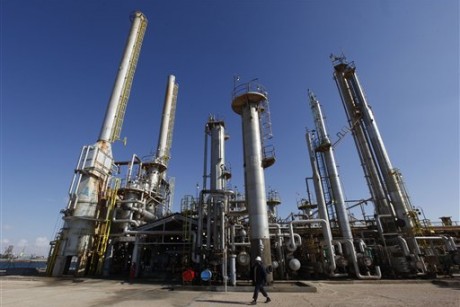* Eastern city wants to restore status as business centre
* Residents say marginalised for decades under Gaddafi
* Benghazi wants return of oil body to city
By Marie-Louise Gumuchian
BENGHAZI, Libya, Jan 23 (Reuters) - At a construction site on Benghazi's waterfront, engineer Seraj Bushada proudly points to a giant hole in the ground that will make way for a 48-floor office tower that city officials hope will help transform part of this port city into a modern business district.
Unlike the capital Tripoli, Benghazi, Libya's second-biggest city, has few modern high-rise developments.
Construction of the $300 million Three Towers project, which will include two smaller blocks housing luxury apartments and a hotel, was delayed due to the uprising against former dictator Muammar Gaddafi, which began here nearly two years ago.
The project is now due for completion in 2015 and is being promoted in Benghazi's bid to regain its former status as the country's business capital and end what residents see as decades of marginalisation under Gaddafi.
"We have to work together to realise this dream," Bushada said.
Turning that dream into reality will be a challenge. Security is a major concern for foreign investors in the city, highlighted by the attack on the U.S. diplomatic mission in September in which the U.S. ambassador and three other Americans were killed.
Only last week a car bomb killed a Benghazi police officer, the second such attack in as many days and the government is considering imposing a night time curfew on the city.
Many Benghazans, however, are calling for the country's new constitution - due to be drafted in coming months - to give the city powers to manage its own affairs and a share of the eastern region's resources.
While the revolution succeeded in overthrowing Gaddafi, they argue, it has failed to spread wealth more evenly in Libya. Benghazi is the main city in eastern Libya, which provides around 80 percent of the country's oil wealth, yet the city is still dependent on the government in Tripoli for funding.
Some residents and officials are calling for the constitution to officially restore Benghazi as Libya's business capital, a status it held under King Idris until his overthrow by Gaddafi in a coup in 1969. With an estimated population of nearly 1 million, it is roughly half the size of Tripoli.
"Everything was here before, Benghazi is the best place to be the economic capital," said businessman Kais el-Bakshishi of the "Benghazi Economic Capital" campaign, which counts about 700 members including local businessmen, activists and academics.
"The main reasons are its strategic location - a gateway to Africa and Egypt and historically the people of Benghazi are traders. A lot of businessmen in Tripoli are from Benghazi."
STRIKING A BALANCE
Perched on the Mediterranean sea, Benghazi was the first city to revolt against Gaddafi and later became the rebels' main base before Tripoli, some 1,000 kilometres (620 miles) away, fell in August 2011.
City officials' first priority is to push the central government to move state companies such as the National Oil Corporation (NOC) and Libyan Airlines, which were based here under King Idris but later moved to Tripoli, back.
"If we can get these back to Benghazi, we can make it the economic capital," said Abdelhamid Elhadad, head of the industrial and oil committee of the Benghazi local council.
"We are trying to restore Benghazi to what it once was," he said, sitting in the council's new offices - where posters claiming "Together we will build our city" hang next to signs banning weapons.
The NOC was formerly the Libyan General Petroleum Company, which was founded in Benghazi in 1968. After the NOC was established in 1970 it relocated to Tripoli.
"The objection is that it is like before - everything is controlled by Tripoli; this is not why the revolution took place," said Tahani Mohammed Ben Ali, head of the Benghazi workers' union at Libya's biggest oil firm Arabian Gulf Oil Company (Agoco).
"There are infrastructure, health, education needs here."
With the country still volatile, Libya's new rulers - led by Prime Minister Ali Zeidan's cabinet and the general national congress - know they have to strike a careful balance to appease regional rivalries.
That plays in Benghazi's favour and the oil ministry has proposed splitting the NOC into an exploration and production company based in Tripoli and a refining and petrochemicals company in Benghazi. Residents in eastern Libya as well as activists and oil workers vehemently oppose the plan, however, and say the whole company should relocate to Benghazi.
"If someone steals something from you, you want it back," Ben Ali said.
Other plans for enhancing Benghazi as a business hub include improving its infrastructure.
Its port is outdated while the airport, which has just one cramped hall, had been slated for an upgrade when the war began.
"The plan before was for 5 million passengers a year, now we want 15 million passengers a year," Bakshishi said.
South Korean company Nemo Partners is building a temporary passenger terminal at the airport. But progress on expanding the airport has been slow as the central government is reviewing previous foreign investment deals in the country before it approves new ones.
Benghazi officials are also considering building a free trade zone and have proposed public works projects to provide jobs, namely for the former rebel fighters who have yet to lay down their weapons.
"We want to look after the factories around Benghazi, we need to boost manufacturing," Elhadad said. "We have an industrial area of around 1,000 hectares, we want to have a real industry here, we want to build more hotels."
Elhadad wants Benghazi to be twinned with cities like Istanbul or Marseille to promote ties and plans to write to the mayor of New York, seeking to attract U.S. interest.
Industry in the area focuses on cement, and cable and steel pipe factories, as well as oil services, but badly needed foreign investment is only trickling in.
The International Monetary Fund forecast Libya's economy shrank 60 percent in 2011 due to the conflict but expected it to expand by 122 percent in 2012 and 17 percent this year.
TRADE PICKS UP
Benghazi still faces many of the same problems as the rest of Libya. Rubbish is piled up on its streets and beaches; jobs are in short supply; and weapons are everywhere as the government has failed to control rival armed factions since the end of the uprising.
However, it has seen more commercial activity in the past year and dozens of new clothing, food and consumer goods shops have sprung up.
"Things are getting better, lots of new businesses were established after the revolution," an Egyptian worker at a supermarket in the city, said. "And people are spending."
One local businessman said retail business in Benghazi had tripled since before the war, but did not cite a source for the figure: "The former fighters have money so they are spending."
At a conference this week, businessmen and campaigners laid out plans for Benghazi's economic revival, but many acknowledged security remained a priority.
Last week Italy - the former colonial power - suspended activity at its consulate in Benghazi and withdrew staff for security reasons after unidentified gunmen opened fire on its consul's armoured car.
The consul was unhurt but the incident recalled the attack on the U.S. mission, in which American intelligence officials say Islamist militants with ties to al Qaeda affiliates were most likely involved. Last week's hostage crisis in Algeria has added to security concerns in North Africa.
"How can you turn Benghazi into an economic capital when there isn't even any security?" Khaled Al-Nomi, a shop assistant, said. "Things are getting worse here, not better."
Many Western businessmen are adopting a wait and see approach towards Libya, keen to see whether the interim government can get a grip on security. Arab and Turkish businessmen are more prominent.
Local Benghazans stress that the violence is more against security officials than civilians, but the attack on the U.S. mission has been a setback.
"Some companies up until last year visited Benghazi," Tarek Alwan, managing director of London-based consulting firm SOC Libya, said.
"Some were actually progressing towards establishing local agents, but since the security is not fully stable in the city, I think many pulled out." (Additional reporting by Ghaith Shennib; Editing by Andrew Torchia and Susan Fenton)




